Contributions Overview
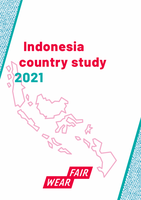
The Indonesian garment industry faced a challenging year in 2021. The excess of COVID-19 pandemic, as well as the turbulent labour regulatory changes due to the enactment of Law Number 11 of 2020 on Job Creation Law has caused notable impact for this sector. To address these issues, Indonesia Fair Wear Country Study 2021 highlights the overview of the Indonesian garment industry’s condition in these past years. This report is equipped with detailed regulatory changes and risk analysis of the most common risks and violations of the labour rights in garment factories in Indonesia, through the lenses of the Fair Wear Code of Labour Practices.

Fair Wear launches “Indonesia Country Study 2021”
The Indonesian garment industry faced a challenging year in 2021. The excess of COVID-19 pandemic, as well as the turbulent labour regulatory changes due to the enactment of Law Number 11 of 2020 on Job Creation Law has caused notable impact for this sector. To address these issues, Indonesia Fair Wear Country Study 2021 highlights the overview of the Indonesian garment industry’s condition in these past years. This report is equipped with detailed regulatory changes and risk analysis of the most common risks and violations of the labour rights in garment factories in Indonesia, through the lenses of the Fair Wear Code of Labour Practices.
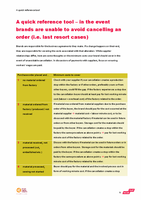
A quick reference tool – in the event brands are unable to avoid cancelling an order
Brands are responsible for the business agreements they make. If a change happens on the brand’s end, it is responsible for covering the costs associated with that alteration. While supplier relationships differ, here are some thoughts on the minimum costs your brand should cover in the event of unavoidable cancellation. In discussions of payments with suppliers, focus on ensuring workers’ wages are paid.
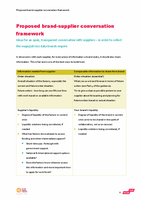
Brand supplier conversation framework
This proposed brand-supplier conversation framework helps facilitate ideas for an open, transparent conversation with suppliers – in order to collect the wage/job loss data brands require.

Labour Minute Costing Calculators
Fair Wear’s Labour Minute Costing Calculators allow brands and factories to ring-fence the labour cost based on a transparent methodology for costing/pricing of goods.
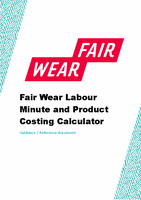
Guidance for Use of the Fair Wear Labour and Minute and Product Costing Calculator
Fair Wear’s Labour Minute Costing Calculators allow brands and factories to ring-fence the labour cost based on a transparent methodology for costing/pricing of goods. These costing calculators have been adapted to take into account the impact of Covid-19. The adaptation to the tool allows a factory to quantify the additional costs a factory has to meet in order the adapt to the corona crisis. Changes in terms of the workforce, overtime, additional overhead costs (such as transportation, disinfectants, face masks or plastic dividers), severance pay and loss in productivity due social distancing and time loss (e.g. because of workers queuing for temperature checking or washing) can be entered into the tool to allow for a new product calculation. Subsequently, a change in product price that take the new reality into account can be calculated as a basis for discussion with the buyer.
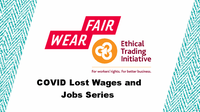
COVID lost wages and jobs series handbook
The Fair Wear / ETI COVID Lost Wages and Jobs Series is a four part webinar series, which lays out guidance for member brands to uphold their responsibilities to workers in their supply chains who are laid-off or facing reduced wages in the context of COVID. This document consolidates the slides from that four part webinar series. Where possible, we recommend brands use this as a complement to their participation in the webinar series. Fair Wear is working with other organisations to tailor these webinars to their membership. If you are a member brand of a responsible business conduct platform, please contact them in case you are interested in participating.
